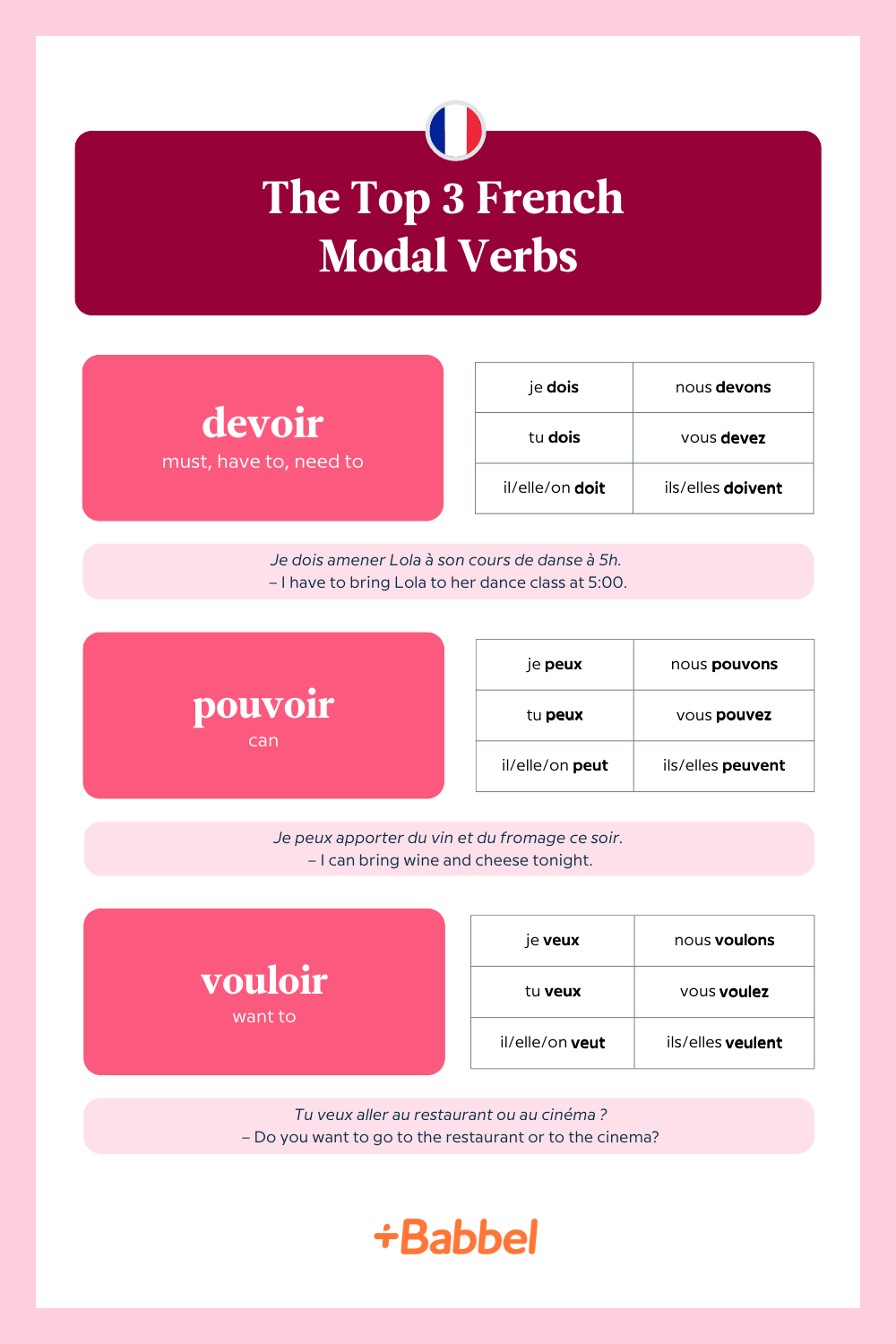Let’s say you already know the 20 most common French verbs. Être, avoir, faire and aller aren’t a mystery anymore. What’s next on the French language chopping block? Let’s take a look at the most frequently used French modal verbs: devoir, pouvoir, and vouloir. These verbs are also known as “modal auxiliaries” because they’re often followed by an infinitive verb.
These verbs especially important because you can use them to express obligation, possibility, permission and desire. They’ll really help you in everyday life! You’ll quickly see how common devoir, pouvoir and vouloir are. Once you know them, you’ll hear French modal verbs everywhere!

The French Modal Verbs
Devoir (Obligation Or Probability)
In French, unlike English, you express obligation and necessity with a single modal verb: devoir. This single verb can express “must,” “have to” and “need to” at the same time. Practical, right? Who said that French grammar is complicated?
- Tu dois prendre des vacances mon cœur, tu dois te reposer ! — You must take a vacation honey, you need to rest!
- Je dois amener Lola à son cours de danse à 5h. — I have to bring Lola to her dance class at 5:00.
Devoir can also express probability. For example, Anne-Sophie n’est pas là, elle doit être malade. (“Anne-Sophie isn’t here, she must be sick.”)
Maybe you’ve noticed that in French, modal verbs are used without a preposition. The infinitive verb comes after the modal verb. Elle doit être…
Here’s how to conjugate devoir in the present tense:
| je dois | nous devons |
| tu dois | vous devez |
| il/elle/on doit | ils/elles doivent |
As a bonus, the pronunciation is the same for the all three singular forms: dwa. It gets easier and easier, doesn’t it?
Pouvoir (Possibility Or Permission)
Pouvoir works like “can” in English. It expresses something that’s possible in a particular context.
Je peux apporter du vin et du fromage ce soir. — I can bring wine and cheese tonight.
Pouvoir can also express permission given by someone.
Les passagers peuvent utiliser leur ordinateur pendant le vol. — Passengers can use their computer during the flight.
But watch out! Unlike “can,” pouvoir doesn’t express a skill that you’ve learned. For that, you use the verb savoir.
Look at the difference between these two examples.
- Je sais nager. — I can swim (because I learned how to).
- Je peux nager. — I can swim (because it’s possible to: the water isn’t too cold, there aren’t any sharks, etc.).
So if you want to show off a bit and say that you can pilot a helicopter or dance polka (to each their own, no judgment here!), you’d use the verb savoir.
And now, let’s conjugate pouvoir.
| je peux | nous pouvons |
| tu peux | vous pouvez |
| il/elle/on peut | ils/elles peuvent |
Again, for the three singular forms, the verb is pronounced the same way.
Vouloir (Desire)
Vouloir expresses desire, like “want to” in English.
Tu veux aller au restaurant ou au cinéma ? — Do you want to go to the restaurant or to the cinema?
In this case, vouloir is also followed by an infinitive like in English, but without the preposition.
Also, Comme tu veux ! means “As you wish!” This is good to know when you can’t make a decision!
Vous voulez continuer ? Then here we go with the conjugation for vouloir.
| je veux | nous voulons |
| tu veux | vous voulez |
| il/elle/on veut | ils/elles veulent |
It shouldn’t come as a surprise that once again it’s the same pronunciation for all the singular subjects.
Tired of French modal verbs and in need of a break? Are you thinking, Je ne veux pas travailler (“I don’t want to work”)? Ok, you’ve earned it. To finish up, here’s a nice little song with some modal verbs that you can hum along to.











